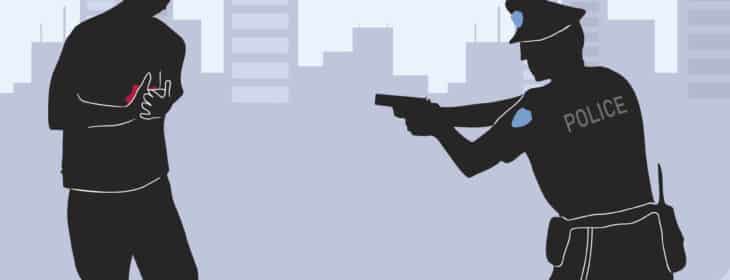
There are many common myths about police. These myths, unfortunately, can put you in great danger if you believe them. They create a false impression about what police officers can do and are trained to do. In this article, we’ll go over four myths and misconceptions about police conduct. We’ll also go over what you can do to keep yourself safe when interacting with the police.
These recommendations are not legal advice, and do not establish an attorney-client relationship between you and our office.
While there are many more myths about police than these four, these are very common misunderstandings. Don’t let yourself fall victim to one of these popular myths.
Police are not trained to shoot at specific body parts, like hands or legs.
Officers are trained to shoot at what they call “center mass”. That is the center of the body, usually around the torso. There are several reasons for this:
Bottom line: If an officer uses his firearm, he will be aiming at the suspect’s body, not his arms, legs, hands, or feet. There is a high likelihood that if an officer fires his weapon, it will be fatal. Don’t put yourself in that situation. Comply first, complain later.
Officers have no way of knowing if a weapon is loaded, and will always assume it is loaded.
Remember, officers are trying not only to protect those around a suspect, but also themselves. They will not wait to figure out if a weapon is actually loaded. Pointing an unloaded weapon at a police officer will get you shot just as easily as pointing a loaded weapon at an officer. Don’t do it.
If you have a weapon — whether it is loaded or not — let the officer know, and move slowly and predictably, keeping your hands up and in view at all times. Comply with any orders the officer gives you. One quick move can end your life.
A knife is considered a deadly weapon. Officers will treat a knife just like a gun for purposes of using deadly force. And don’t expect an officer to match your chosen weapon if you threaten him with a knife. If you point a knife at an officer, you will likely be shot with a gun.
The same thing applies to other weapons like baseball bats, hammers, or metal rods. Anything that can cause serious damage will be considered a deadly weapon, and could get you shot.
And, needless to say, there is nothing to gain (and a lot to lose) by threatening an officer in any way.
By definition, “warning shots” are gunshots fired in a direction other than the suspect, like the ground or the air.
Warning shots have been prohibited for decades. Although there is some debate about allowing warning shots, they are generally prohibited, because of their tendency to strike unintended targets.
warning shots may end up striking other people, striking vehicles, or striking other objects. The whole point of an officer firing his or her weapon is to neutralize a threat, not to create one.
In fact, warning shots have been known to actually strike the suspect despite the officer’s intention to miss. In one case, an officer fired at the ground in front of the suspect, and the bullet richocheted off the sidewalk and struck the suspect.
So don’t assume you get a freebie, and wait until you hear the warning shot before you comply or submit to arrest. The first shot you hear may be the last thing you ever hear.
There are many more myths about police out there. Don’t believe these myths – they could put you in significantly greater danger. Even if you believe that the police are wrong for stopping you, that’s no reason to put yourself in a worse position.
Let’s review:
The best way to stay safe and maintain your legal rights when dealing with the police is by remaining calm and compliant. Even if the police are doing something incorrectly, it’s best to follow their instructions and comply. It will put you in the safest position physically and the strongest position legally.
Check out this handy guide for dealing with the police to avoid putting yourself into serious danger. It can also help you to make sure that you maintain your strongest legal case against police misconduct.
If you believe you or someone you know has been the victim of false arrest, police brutality, excessive force, or any other legal or constitutional violation, contact Chicago civil rights attorney Jordan Marsh for a free consultation at (224) 220-9000, or by email at jordan@jmarshlaw.com.
The information provided on this website does not, and is not intended to,
constitute legal advice; instead, all information, content, and materials available on this site are for general informational purposes only. Use of and access to this website or any of the links contained within the site do not create an attorney-client relationship between you and our office.